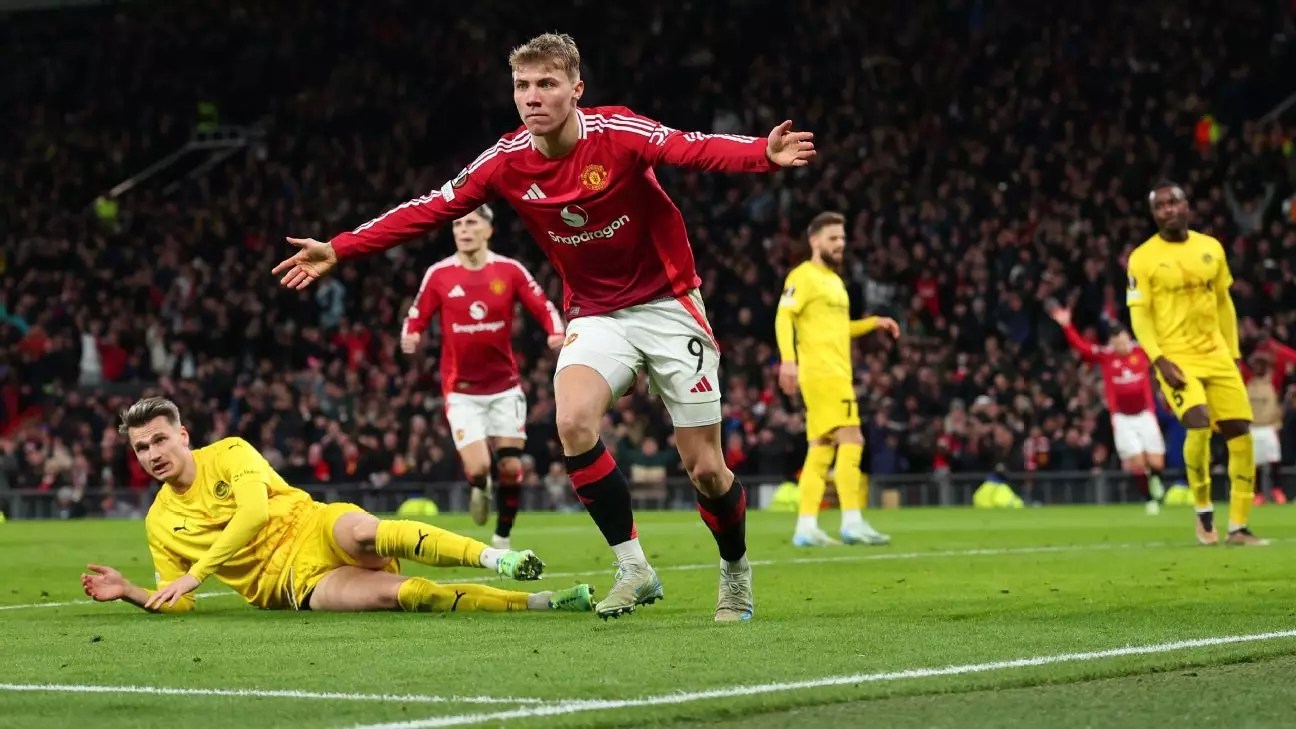Manchester United’s ambitious aspirations have taken a new direction under the guidance of Ruben Amorim. Following a rocky transition period marked by inconsistent performances and a struggle to find the net, the Portuguese coach finally achieved his inaugural victory with the club at Old Trafford. The triumphant encounter against Bodø/Glimt in the UEFA Europa League showcased a glimmer of hope for the season, aided by a stellar performance from Rasmus Højlund, who delivered two crucial goals to lead his team to a thrilling 3-2 comeback victory.
With this win, Amorim is optimistic about the future, though he remains aware of the inevitable hurdles that lie ahead. Central to this hope is Højlund, whose attacking prowess suggests the potential for a significant turnaround in United’s fortunes. His skills were on full display, especially with his remarkable first goal, which saw him skillfully maneuver the crowded penalty area and volley home under pressure just before halftime. This goal, coming on the heels of a shaky start that saw United concede twice after initially leading, proved vital in shifting the game’s momentum.
Despite the victory, Amorim is cognizant of the pressing concern regarding the team’s offensive output. United’s struggles to score, which have plagued them since the beginning of the season, indicate that reliance on an emerging talent like Højlund will be essential. The hefty price tag of £72 million that United paid to Atalanta for the young forward has raised expectations, and Amorim’s challenge is to integrate him effectively into the squad’s dynamics.
Under previous manager Erik ten Hag, questions arose surrounding tactical deployment and how well Højlund’s strengths aligned with the team’s style. Thursday’s match saw a shift in this narrative, with Højlund benefiting from quality deliveries into the box—two goals facilitated by well-placed crosses from Noussair Mazraoui and Manuel Ugarte. Amorim underlined Højlund’s importance to the team, noting areas for improvement but also praising his aggression in front of goal and ability to contribute to team transitions.
The path ahead for Amorim is far from straightforward. Although the victory against Bodø/Glimt indicates progress, certain perennial issues persist, particularly in defense. The alarming trend of conceding quick goals—an issue that plagued the team during Ten Hag’s tenure—was painfully evident as United allowed Bodø/Glimt to net twice in just four minutes. Amorim’s presence on the touchline, marked by fervent encouragement and frustration, reflects the strenuous effort required to reshape this team’s mentality.
The players, who often appeared overwhelmed, must adapt to Amorim’s tactics while developing a stronger connection on the pitch. His commitment to building a cohesive unit is evident, as he urges players to take risks and maintain a higher defensive line—but consistency remains elusive. The pace of English football, accentuated by a demanding fixture schedule, adds layers of complexity to his mission. With an immediate return to Premier League action against Everton looming, Amorim’s ability to seize upon this brief window for improvement will be crucial.
Amorim acknowledges that progress will not manifest overnight. He expressed that while there have been improvements in ball control, tempo management, and creating chances, there are still significant areas requiring enhancement, such as defensive transitions. The potential for individual brilliance from players like Alejandro Garnacho and Marcus Rashford is evident, yet converting opportunities into goals remains a persistent challenge.
In his post-match reflections, Amorim emphasized the support from the Old Trafford faithful—an encouraging sign that fans are willing to embrace his vision for the club. Despite navigating the complexities of integrating his philosophy amid established habits from previous regimes, there’s a sense that the remnants of a once-great side can be rekindled. Amorim’s commitment to fostering growth and his acknowledgement of the team’s current limitations reveal a coach aware that patience is essential in charting a new course.
Ruben Amorim’s first win as Manchester United’s manager serves as a symbolic stepping stone in the club’s ongoing journey of transformation. With Rasmus Højlund emerging as a central figure amidst the shifting tides, the combination of youthful talent and tactical evolution may succeed in revitalizing a team that has lingered in mediocrity for too long. The challenges are vast, but if Amorim can harness the potential within his squad while addressing the lingering issues, perhaps Old Trafford will soon witness the resurgence of a club that once inspired awe. As the season unfolds, one thing is clear: for Amorim and United, the road ahead is fraught with trials, but it is also rife with possibilities.


Leave a Reply